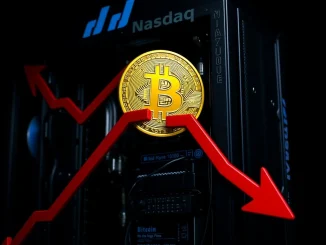
Buckle up, investors! The stock market experienced a jolt today as the Nasdaq Composite Index took a significant dive, dropping over 3% intraday. This dramatic downturn sent ripples across Wall Street, pulling down the S&P 500 and the Dow Jones Industrial Average along with it. For those watching their portfolios, especially in the volatile world of cryptocurrencies, understanding these market movements is crucial. Let’s break down what happened and what it might mean for you.
Decoding the Market Downturn: What Happened to Nasdaq?
The day witnessed a sharp and swift decline in the major U.S. stock indices. Leading the pack was the technology-heavy Nasdaq Composite, which plummeted by a staggering 3.26% during intraday trading. This steep fall wasn’t isolated; it was part of a broader market downturn affecting the entire U.S. equity landscape.
Here’s a quick snapshot of how the key indices fared:
| Index | Intraday Drop |
|---|---|
| Nasdaq Composite | 3.26% |
| S&P 500 | 2.15% |
| Dow Jones Industrial Average | 1.39% |
As you can see, the Nasdaq, known for its concentration of growth and technology stocks, experienced the most pronounced decline. The S&P 500, a broader measure of the stock market, also saw a significant dip, while the Dow Jones, comprising more established and industrial companies, was relatively more resilient but still firmly in the red.
Why is the Stock Market Plunging? Understanding the Factors
So, what triggered this sudden market downturn? While pinpointing a single cause is often impossible, several factors are likely contributing to the negative sentiment currently gripping the stock market. These could include:
- Economic Data Concerns: Recent economic indicators might be painting a less optimistic picture than anticipated. This could involve worries about slowing growth, persistent inflation, or a combination of both (stagflation).
- Interest Rate Hikes: Anticipation or announcements of further interest rate hikes by central banks to combat inflation can spook investors. Higher interest rates can make borrowing more expensive for companies, potentially impacting their profitability and future growth prospects.
- Geopolitical Uncertainty: Global events and geopolitical tensions always add a layer of uncertainty to the stock market. Unforeseen events can rapidly shift investor sentiment and trigger sell-offs.
- Profit Taking: After periods of gains, some investors may decide to take profits off the table, leading to downward pressure on stock prices. This can be exacerbated if market sentiment turns even slightly negative.
It’s important to remember that stock market fluctuations are normal. Intraday drops, even significant ones like this, are part of the market’s ebb and flow. However, understanding the potential drivers behind these movements can help investors make more informed decisions.
Impact on Cryptocurrency Markets: Should Crypto Investors Be Concerned?
For those invested in cryptocurrencies, the question naturally arises: how does this stock market downturn affect the crypto space? In recent times, we’ve observed increasing correlation between traditional stock markets, particularly the Nasdaq, and the cryptocurrency market, especially Bitcoin and Ethereum.
Here’s what crypto investors should consider:
- Risk-Off Sentiment: A market downturn in traditional finance often triggers a “risk-off” sentiment across the board. Investors tend to move away from riskier assets, which can include both tech stocks (prominent in Nasdaq) and cryptocurrencies.
- Liquidity Concerns: During periods of market stress, investors might liquidate assets across different classes to raise cash or cover margin calls in other areas. This can lead to selling pressure in crypto markets as well.
- Potential Contagion: While cryptocurrencies operate on a different technological and regulatory framework, significant events in traditional finance can sometimes spill over and affect crypto market sentiment and investor behavior.
However, it’s also crucial to note that the cryptocurrency market has its own unique dynamics. It’s driven by factors specific to the crypto ecosystem, such as technological developments, regulatory updates, adoption rates, and token-specific news. Therefore, while traditional stock market movements can influence crypto, they are not the sole determinants of crypto market performance.
Navigating Market Volatility: Actionable Insights for Investors
In times of market downturn and volatility, it’s essential to maintain a balanced perspective and avoid panic-driven decisions. Here are some actionable insights for investors:
- Stay Informed: Keep yourself updated on market news and economic developments. Understanding the potential reasons behind market downturns can help you make rational decisions rather than reacting emotionally.
- Review Your Portfolio: Assess your portfolio’s risk exposure. Ensure your asset allocation aligns with your risk tolerance and long-term financial goals.
- Consider Diversification: Diversification across different asset classes can help mitigate risk. If your portfolio is heavily concentrated in one area, consider diversifying to reduce the impact of a market downturn in a specific sector.
- Think Long-Term: Stock market downturns are often temporary. If you are a long-term investor, try to focus on the fundamentals of your investments and avoid making rash decisions based on short-term market fluctuations.
- Dollar-Cost Averaging: For those looking to invest during a market downturn, dollar-cost averaging – investing a fixed amount of money at regular intervals – can be a strategy to consider. It helps to average out your purchase price over time and potentially benefit from lower prices during dips.
Conclusion: Riding the Waves of Market Fluctuations
The Nasdaq‘s intraday drop of over 3%, along with the broader stock market downturn, serves as a reminder of the inherent volatility in financial markets. While such events can be unsettling, they are also a normal part of the investment cycle. For cryptocurrency investors, understanding the interplay between traditional and crypto markets is increasingly important. By staying informed, maintaining a long-term perspective, and employing sound investment strategies, you can navigate these market fluctuations and position yourself for future opportunities. Remember, market downturns can also present buying opportunities for those with a long-term vision and a well-thought-out investment plan. Stay calm, stay informed, and ride the waves.



